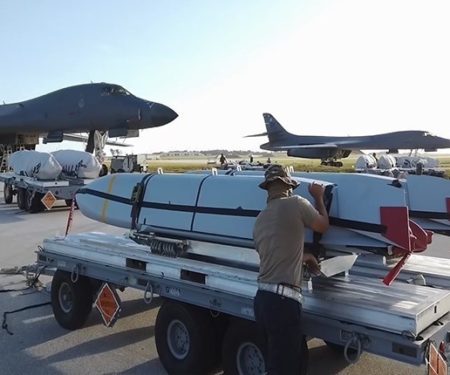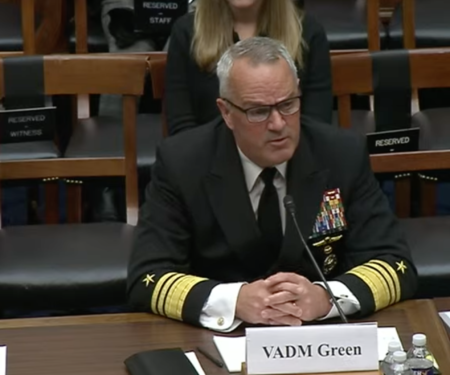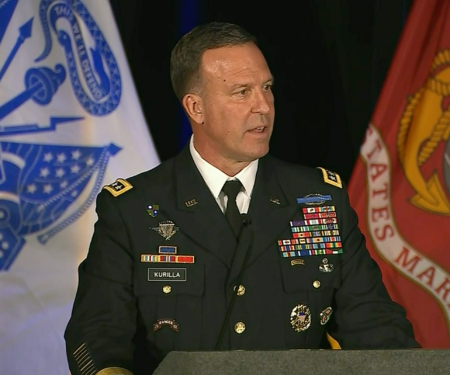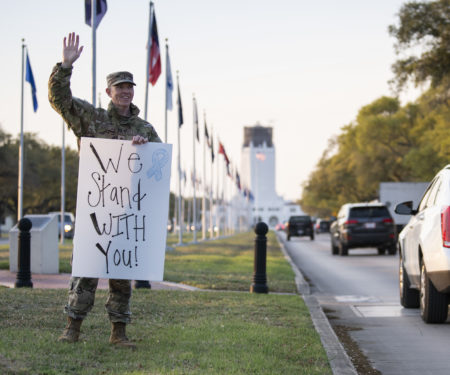Radar Sweep
Faulty Trim Kept KC-46 Emergency Exit Door From Opening
A problem with the trim on the KC-46A Pegasus’ overwing exit doors kept it from being able to open, which could have hindered passengers’ ability to escape during an emergency. U.S. Air Mobility Command said the Air Force’s engineers worked with KC-46 manufacturer Boeing to create and issue a time compliance technical order to modify the refueling tankers’ doors in the field. Velcro has been applied to the bottom part of the panel to keep it in place and prevent vibrations, Boeing said.
Air Force Pilot Shortage May Take Decades to Fix, but Service is Making Headway
It may take 20 years or more before the Air Force has its pilot shortage situation back to where it is breaking even. For years, the service has been operating at times with thousands fewer pilots than it needs, and the issue is one that will continue for the long haul, says Maj. Gen. Albert G. Miller, Air Force director of training and readiness for operations. “The Air Force finds itself short about 1,650 pilots,” Miller said. “That’s an improvement over last year, where we were just over 1,900 pilots short. We see that as a positive for the Air Force, but there’s still a lot of work to be done to get us back to where we want to be.” A majority of the shortage is with fighter pilots, where the service is down about 1,100 Airmen.
Paid Advertisement: Innovative Technology Helps Airmen Navigate and Utilize Mental Health Resources
The last few years have seen a dramatic increase in mental health conditions for Americans in general, and for military service members, in particular. In recent years, the Air Force has taken deliberate steps to encourage mental wellness and provide support for Airmen through innovative digital solutions. Air Force leaders have partnered with NeuroFlow, a Veteran-founded technology company. NeuroFlow aggregates user data and feeds it into a clinical dashboard that unit leaders can review to better understand the behavioral health trends of Airmen over time.
Even With Ukraine Operations Ongoing, Air Mobility Commander Focused on China
In just a year, the U.S. Air Force’s mobility fleet has had to shoulder two intense, arduous missions: the evacuation of 124,000 civilians from Afghanistan and the ongoing transport of U.S. troops and weapons to Eastern Europe following Russia’s war against Ukraine. But even as young Airmen work tirelessly to shuttle anti-tank and anti-air missiles to Romania so that they can be transferred to Ukrainian forces, or to fly C-17s to deploy thousands of U.S. Soldiers to reinforce NATO’s eastern front, Air Mobility Command head Gen. Mike Minihan said his eyes remain on China.
Ukraine's Air Force Pleads for Modern Fighters From U.S.
Retired Air Force Lt. Gen. David A. Deptula, dean of the Mitchell Institute for Aerospace Studies, joins Shep Smith to discuss whether air superiority will really be the deciding factor in beating the Russians during the war in Ukraine.
Ukrainian Hackers Take Aim at Russian Artillery, Navigation Signals
The nearly two dozen volunteers of the CyberPan Ukraine group work with the Ukrainian military and get funds from sources in Israel and the United States, group members told Defense One. In the weeks since Russia invaded Ukraine, one member said, the group has found ways to keep some field units from receiving signals from the GLONASS system, Russia’s version of the U.S. GPS satellite navigation constellation. Lost Russian forces are easier to find and target than ones that know where they are going. Currently, the group is looking for ways to disrupt artillery fire, at least from systems that employ precision guidance systems. The member said the group has identified several computer servers linked to Russian rockets.
‘I Don’t Think I Could Do 20 Years of This’: Military Families Still Struggling With Mold at Privatized Housing
Military families continue to face issues with unhealthy living conditions at privatized housing, as well as unresponsive landlords and military officials, despite the Pentagon implementing a tenant bill of rights last year, families testified to Congress. “Each citizen puts their faith in us to protect the standards of this country,” Army Private First Class Cody Calderon said at a hearing held by the House Appropriations Committee’s military construction subcommittee. “What happens when the standards, the foundation that supports those protectors, is built on these mold and sewage and lead and pest issues?”
Senior Leader Movements
Air Force Secretary Frank Kendall announced a series of senior officer movements, including three retirements, eight new general officer assignments, and three Senior Executive Service assignments.
Aussies ‘Secretly Cancel’ $1.3B AUD Drone Deal; Nixing French Subs May Cost $5B
In what was a pretty uncomfortable and revealing hearing in Australia’s Senate, the Ministry of Defense disclosed it has canceled a deal to buy MQ-9B drones from General Atomics—a sale seven years in the making. The cancellation occurred largely as a result of Australia’s decision to commit the considerable sum of $10 billion AUD ($7.4 billion USD) for the next 10 years—not previously funded—on the Australian Signals Directorate.
AFA Helps Bring Pilot for a Day to Nellis AFB
Nellis Air Force Base, Nev., in conjunction with the Air Force Association and The Check-6 Foundation, hosted Willians "Willy" Urrutia-Meija Jr., 12, for a Pilot for a Day event . Willy and his family joined Airmen at Nellis for a grand tour of aircraft and facilities, learning about the Air Force and its many missions and career fields. Pilot for A Day provides critically ill youth with the opportunity to experience a "day in the life" of an Air Force pilot and create lifelong memories with their family. As an honorary pilot, Willy wore a flight suit with personalized patches provided by The Check-6 Foundation.
The Military is Trading Its Tiny Tabasco Bottles for Powdered Hot Sauce in MREs
It’s one of many changes that was approved for the next generation menu of MREs—short for Meal, Ready to Eat—in February. While the miniature Tabasco bottles may be iconic, having seasoned (or soured) many meals while in the field, the powdered stuff is simply lighter and cheaper. And while troops in focus groups and questionnaires consistently ranked hot sauce favorably, researchers—whose job included sifting through discarded MREs—found that when it came to the miniature bottles, that love may have been more symbolic than practical.



